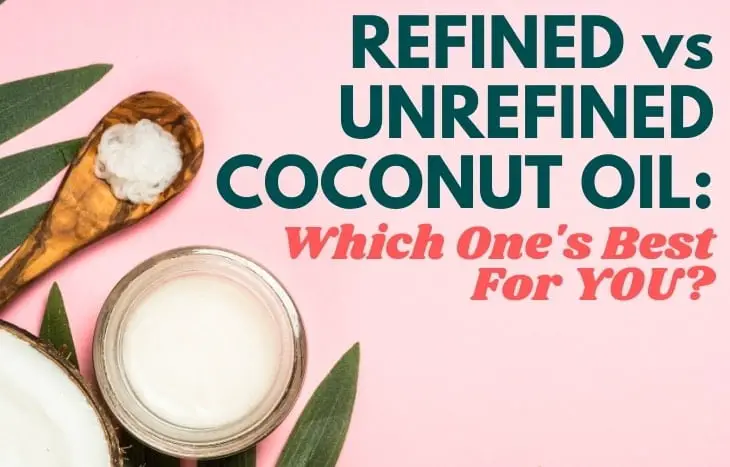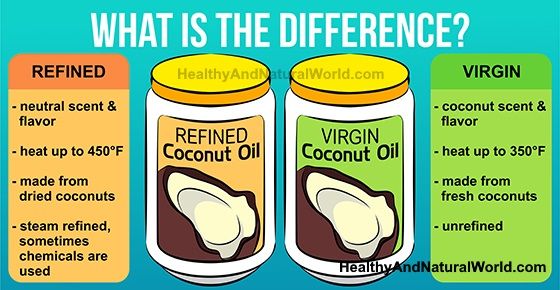Refined Vs Unrefined Coconut Oil- Which One To Pick?
Refined vs unrefined coconut oil. Which one should you utilize more and why? Let’s find out and answer all the queries in your mind.
Coconut oil without any doubt has emerged as one of the best cooking oils used all over the globe for the past several years. Also, it is traditionally used as the primary source of fat in many Asian and Pacific counties.
This plant-based oil possesses amazing properties that most cooking oils do not such as saturated fats in abundance. This property makes coconut oil solid when kept at room temperature instead of being in liquid form.
Not only this characteristic, but coconut oil also has medium-chain triglycerides or MCTs with lauric acid which provides heart-protective benefits and fat burning advantages.
Although there are numerous benefits of using coconut oil, from cooking delicious dishes to acting as a great body moisturizer, understanding the difference between refined vs unrefined coconut oil will help you determine which one to use and when.
You might be curious about which one to use among refined vs unrefined coconut oil. Let’s find out!
Refined Vs Unrefined Coconut Oil
You may have read different labels on the coconut oil you frequently see in the markets such as refined, virgin, or unrefined. What is the possible difference between refined vs unrefined coconut oil or that of virgin oil? The differences lie within the source, processing, flavor, smoke point, and cooking properties of the oil.
1. Refined vs unrefined Coconut oil- Production

The vital difference between refined and unrefined coconut oil is how both the oils are produced, which affects some physical properties of these oils like smoke point and flavor.
Unrefined coconut oil is also referred to as virgin coconut oil. It is simply the oil that is directly generated or produced from the coconut meats without undergoing further processing. There are two ways used for extracting virgin or unrefined coconut oil from coconut meat. These include:
Wet method
This is a simple technique that involves pressing the coconut oil and milk out of the coconut meat or flesh and then separating both liquids.
Dry method
In this technique, the machine is used to press coconut oil out from the dried flesh of coconut. also called copra.
Most virgin or unrefined coconut oil is generated using the wet method. You might see some virgin oil labeled as “cold-pressed”, which indicates that no heat has been used in the extraction process.
Unrefined coconut oil has a strong coconut fragrance and scent and is usually solid at room temperature. This oil can impart the same scent and taste to food that you prepare out of it. The smoke point of virgin coconut oil or the temperature at which it starts to smoke is 177 degrees Celsius or 350 degrees Fahrenheit.
Refined coconut oil on the other hand undergoes additional processing to make it better suited for cooking purposes. It starts with pressing raw oil from copra or dry coconuts. At this step, the process might be somewhat similar to the one used in dry extraction.
One or more steps may be involved, based on the process for manufacturing the oil. The steps involved are:
Degumming
Crude coconut oil is combined with degumming agents for eliminating gums which may alter the quality and texture of coconut oil. Later, the oil is washed using water to separate the gums from coconut oil.
Neutralizing
In this step, lye or sodium hydroxide is added to the oil separated which produces soap with free fatty acids inside the oil. This oil is later washed with water to remove all the free fatty acids and soap. This is done to reduce the rancidity risk as free fatty acids are more prone to get oxidized.
Bleaching
After neutralization is done, the oil is bleached. Bleaching is achieved by filtering the oil through an activated filter of clay. Bleach itself is not utilized in this procedure.
Deodorizing
The last step involved is deodorizing the oil. It is done through heat to eliminate any remaining coconut fragrance or taste from the oil.
While the coconut oil formed through this procedure is processed, it has a higher temperature or smoke point of 204 degrees to 232 degrees Celsius which makes it highly suitable as a cooking oil. Other properties that make it useful are its odor-free and flavor-free properties.
In addition to this, both unrefined and refined coconut oils have similar nutrient profiles and provide 120 calories of pure fat per 14-gram serving. Also, both contain a similar MCT ratio along with lauric acid ratio and saturated and unsaturated fats.
Refined vs Unrefined coconut oil- Which one to use
Know that for the most part, deciding which one to use among unrefined and refined coconut oil is a matter of personal choice. However, there are a few applications for which using one type among these might be better than the other. Some example include:
2. Refined vs unrefined coconut oil- Baking

Due to the strong taste and scent of coconut oil, choosing refined coconut oil will be better suited for baking purposes. If you utilize refined oil, the dish prepared will have no coconut smell or taste that might otherwise clash with the scent and flavor of other ingredients you are using and destroy the original flavor of the product.
However, if you wish to use unrefined coconut oil and do not dislike the flavor it has, the lower smoke point is not very likely to affect the quality of the baked goods, as the food itself does not generally reach such high temperatures even if you set the oven higher than 350 degrees Fahrenheit.
Regardless of the type of coconut oil you are using, both types are great alternatives to butter in terms of baking your favorite vegan dishes as they are solid when kept at room temperature.
This makes coconut oil suitable and ideal in many recipes like pie crusts and vegan biscuits in which the usage of solid fats assists in creating a flaky and light product.
3. Refined vs unrefined coconut oil- Cooking

In cooking, a higher smoke point is necessary. As you already know refined oil has a higher smoke point which makes it the winner among the two. It is perfect for high heat cooking like sautéing and stir-frying. This lets you look at high temperatures, thus resulting in products that are crispy and not burnt.
You may still use unrefined coconut oil too for cooking. The only drawback is that you will have to cook for a longer time keeping the temperature lower than usual.
Alternatively, using avocado oil might be better suited for cooking high heat dishes and applications like deep frying. The smoke point of avocado oil is 488 to 520 degrees Fahrenheit and it has a mild nutty scent that often complements well with sautéed and fried foods.
On the other hand, if you want an oil simply for dressing the salads or to drizzle over some prepared food, using extra virgin olive oil is a great option as it is liquid at room temperature and the taste is mild too. You can also use it for cooking as well as the smoke point of this ranges from 350 to 410 degrees Fahrenheit.
4. Skin Care and Hair Care
Many people often use coconut oil as a moisturizing their skin and for conditioning their hair. Although you can also use refined oil for this purpose, if the smell of unrefined or virgin oil bothers you, unrefined oil is always a better choice as it is least processed and it is likely to be more gentle on your skin and hair.
5. Dietary Needs

Finally, some people like using coconut oil because it suits their dietary choices. For example, this oil is popular for people opting for high fat and low carb diets as it has a small amount of MCT oil which is potentially fat burning in nature.
Also, for people following keto diets, either type of refined or unrefined coconut oil is great as both have similar nutritional profiles. However, some people might be more bothered with the dietary quality than the content of macronutrients within it. For instance, people on minimally processed diets like cleaning eating or paleo can use unrefined coconut oil as it makes a great choice due to its least processed nature.
These were some important differences between refined and unrefined coconut oil. If you are willing to buy coconut oil but cannot determine what aspects to notice, here is a small guide to help you.
How to purchase coconut oil
Whether you opt for refined or unrefined coconut oil, there are some considerations that you must keep in mind when browsing for oil on the shelf.
Food grade
If you wish to use coconut oil for raw consumption or cooking, look for food-grade coconut oil. A coconut oil similar to this will also come in handy for your body and skin.
Organic
Generally, you do not have to buy organic as coconut oil as it does not have significant quantities of pesticide residue on them. But, having said so, you should buy the one that is certified as organic oil which indicates it has no harmful chemicals used during the process of extraction.
Cold-pressed
This simply means that the oil was processed without using heat making it closer to the fresh coconut product.
Transparency
Always read the labels and conduct prior research to prevent buying from brands or suppliers that do not mention the type of coconut used or how the oil was produced.
Some Uses of Refined and Unrefined Coconut Oils
There are numerous purposes for which you can implement both refined as well as unrefined coconut oil. Some important ones are mentioned below for additional information:
- Moisturizer- Avoid regular lotions and possibly decrease the emergence of stretch marks along with cellulite with regular application of coconut oil.
- Style- You can also use coconut oil as a heat protectant just before heat styling your hair to protect it from damage.
- Deep conditioner- Apply a coconut oil hair mask several times a month for smooth and soft locks (also excellent for a deep conditioning skin mask).
- Diminish dark circles- Coconut oil might help decrease inflammations and diminish dark circles.
- Calm rosacea- Moisturizing is a great friend of yours when it comes to calming rosacea. Using coconut oil can be highly hydrating.
The Bottom Line
All in all, using refined or unrefined coconut oil can be a great companion in day-to-day purposes and is pretty useful when applied correctly. Refined and unrefined coconut oils are quite the twins when it comes down to their great nutrient profiles, but they are also very diverse in how they are extracted and processed.
Refined coconut oil will always have less of the typical coconut smell and odor with a more potent smoke point, while unrefined coconut oil always possesses a bold coconut flavor and typical smell with low smoke point and is less processed, thus containing fewer chemicals or no chemicals at all.
Determine correctly what you wish to use the coconut oil for and then you will be able to choose which one to opt for. Making that delicious stir-fry or dressing that oil through the hair, the choice is yours. If you are fine with the smell of unrefined coconut oil, you must opt for it as it has fewer artificial chemicals.

